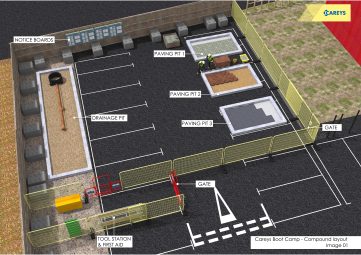
How rural entrepreneurs are rising to the challenge of Covid-19
As we begin a new year we inevitably reflect on the last – and there aren’t many sad to leave 2020 behind. Covid-19 and the ensuing lockdowns forced many aspects of modern life to grind to a dramatic halt. Businesses inevitably suffered and, heartbreakingly, many people lost loved ones.
Many of the challenges have rolled into 2021 but, amidst the wreckage of the pandemic, there have been glimmers of hope. Some rural businesses successfully pivoted overnight, transforming their existing operations to provide something more suited for these uncertain times. When the British public was granted a bit more freedom over the summer, landowners opened new campsites to cater for the upsurge in demand or adapted their holiday accommodation to allow people to visit in a way that felt safe and secure. The space and tranquility offered by the countryside became a refuge for many. And many found themselves in high demand and worked around the clock to provide their products or services to those unable to leave their homes
Other News
Countryside Stewardship scheme re-opens
Landowners can once again apply to be part of a Countryside Stewardship scheme. The application window opened on 9 February for a number of options including Higher Tier, Mid Tier, Wildlife Offers and the new-look Woodland Creation and Maintenance grant.
Higher Tier applicants and those seeking New Capital Grants must submit their proposals to the RPA by 30 April, while Mid Tier and Wildlife Offers have until a deadline of 30 July. The woodland creation and woodland maintenance offers have been merged to form the Woodland Creation and Maintenance grant.
Agreements are scheduled to be offered between September and December for most schemes, although many previous applicants are still waiting to hear whether they have been accepted.
Go to gov.uk to find out more.
DEFRA opens gene editing consultation
Bolstered by the UK’s newfound independence from EU regulations, the government launched a consultation on gene editing. Its use is tightly restricted under EU law, but the UK is now potentially free to explore the technology’s potential, with possibilities including developing crops that are more resistant to extreme weather and disease. Speaking at the Oxford Farming Conference, Environment Secretary George Eustice said the technology speeds up the natural breeding process that farmers have been doing for centuries.
The consultation will run until 17 March.
After a trade deal was agreed at the eleventh hour on Christmas Eve, there were hopes that 2021 would proceed smoothly in terms of UK-EU relations. Unfortunately customs red-tape led to reports of thousands of tonnes of meat being left to rot, delays, complicated paperwork and unforeseen costs leading to orders being cancelled. The seed potato industry was up in arms over the export ban on some 30,000 tonnes worth £13.5m too – at the time of writing, DEFRA is working to resolve the issue.
More in Property

Seven companies relocating to The Oxford Trust’s new Oxford Centre for...
Seven science and tech start-ups and SMEs are to move from The Oxford Trust’s current Oxford Centre for Innovation to its new location at Blue Boar Court, Alfred Street, in Oxford’s city centre.

Pioneering Careys Construction Campus to be piloted at Oxford North
Oxford North, the new £700 million innovation district in Oxford, is to welcome Careys Construction Campus to provide free, flexible on-site ground working construction training which will guarantee an offer of an interview on completion of the training and boost jobs and talent in the industry.

The Art of Horticulture, Design, and Woodland Creation at Nicholsons
At Nicholsons, the blend of horticultural expertise, creative design, and environmental responsibility comes together to create breathtaking landscapes and future-proof woodlands. Managing Director Liz Nicholson shares insights into how the company continues to innovate in these areas, staying true to its values of creativity, passion for the planet, and dedication.
From this author

UK Biomass Potential for BECCS Land Occupier Survey
Carter Jonas have been commissioned to provide research and information on the future of Biomass and the potential supply of feedstock for power generation within the UK.

Are we overcoming the polarisation and prejudice that later living schemes...
In a 2018 article, we highlighted that communities are too often unbalanced and polarised and warned, ‘If age segregation is defining our communities today, then action must be taken to prevent it escalating further’. Three years on, Planning & Development Insite considers whether society and our industry has actually made any progress.

Biodiversity, Amenity and Diversification
The tree drivers for land purchases you may not have considered.

